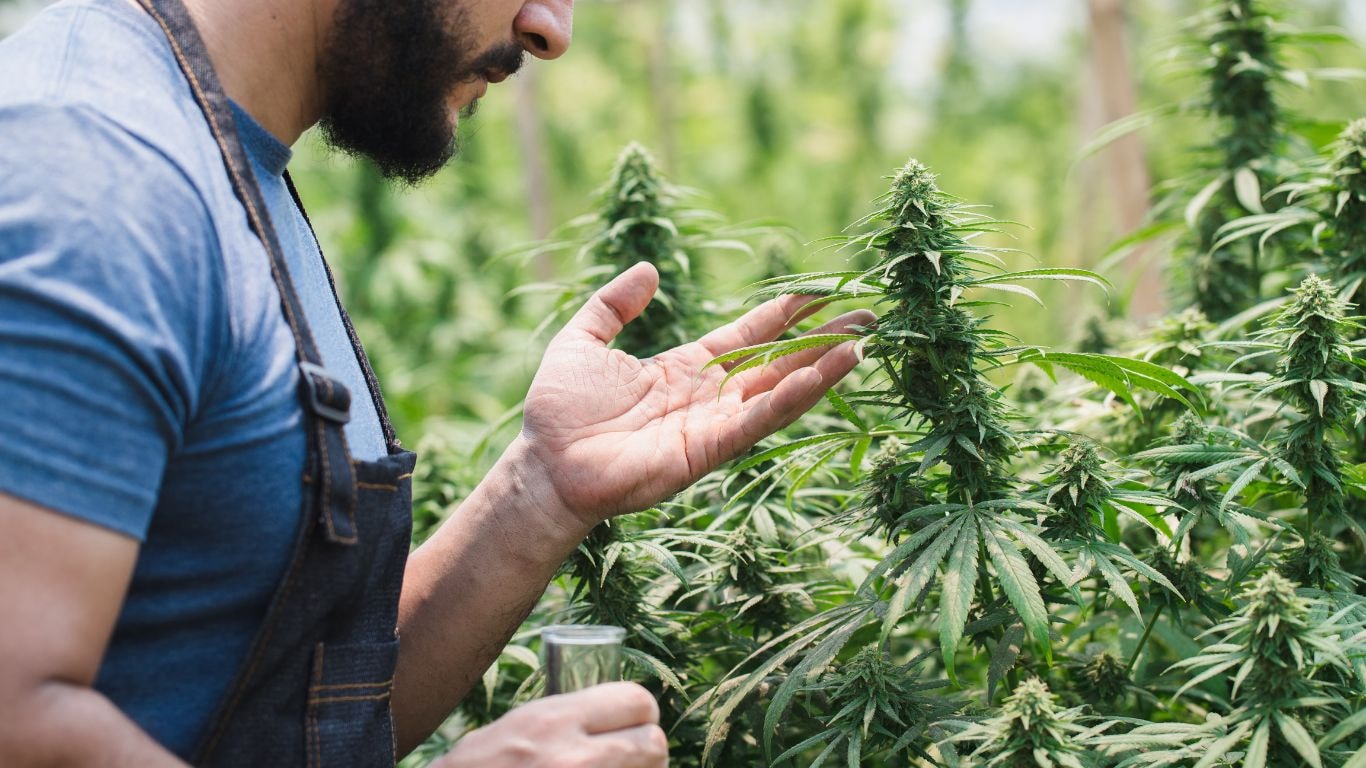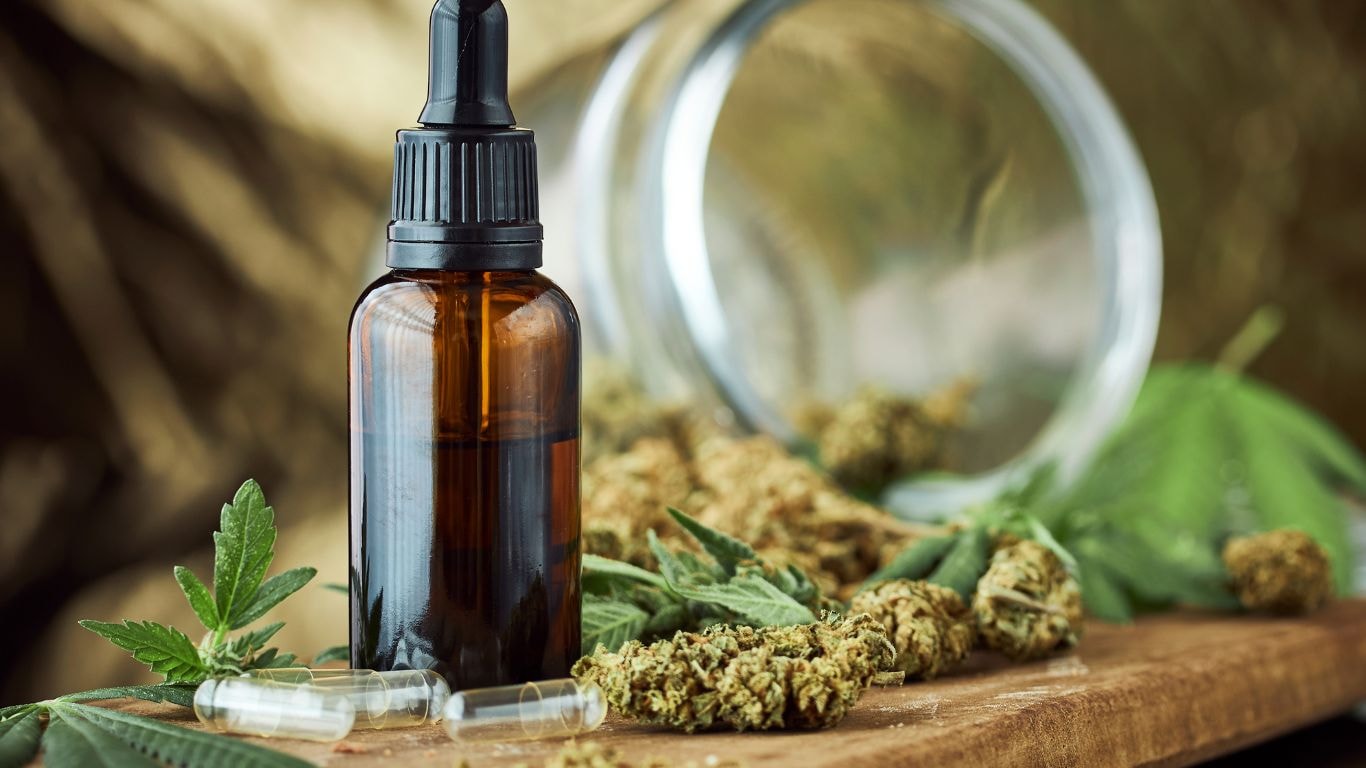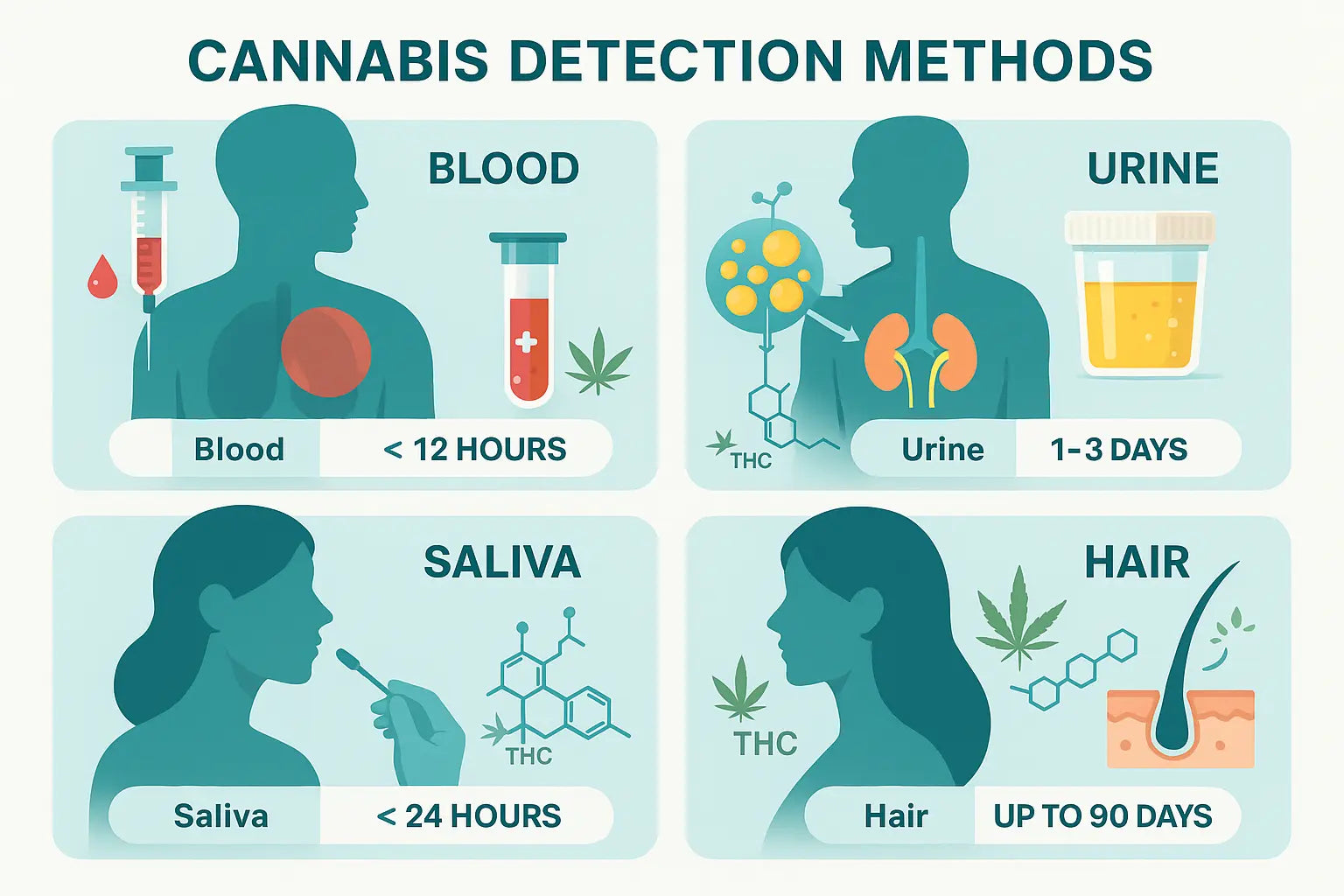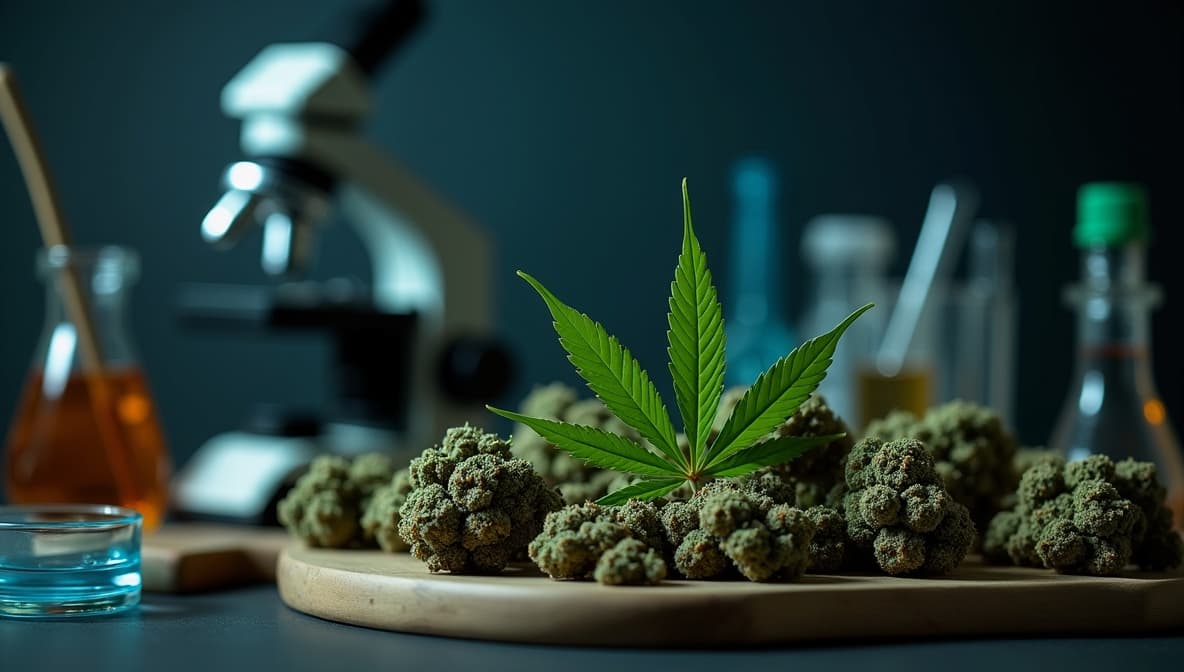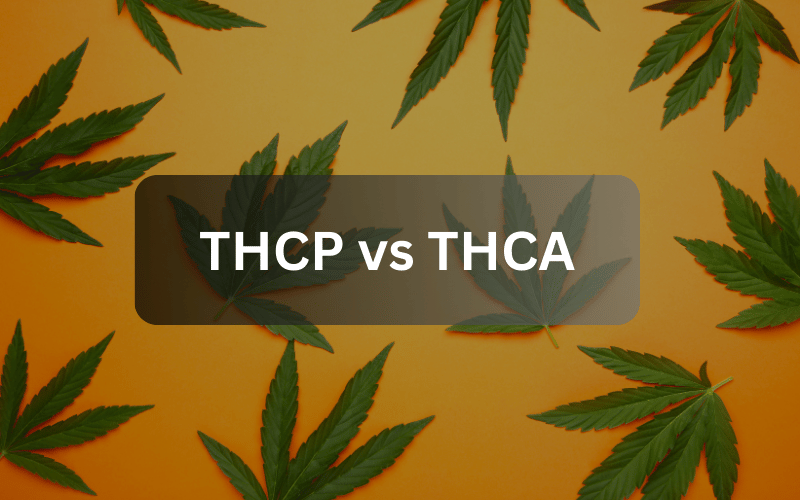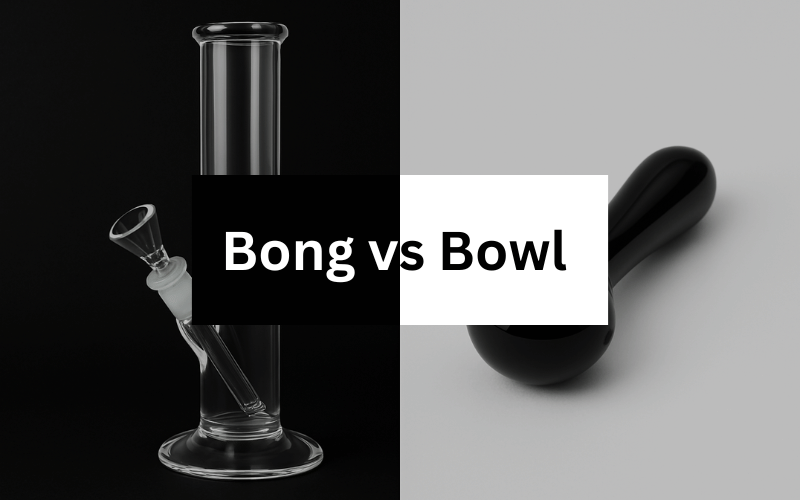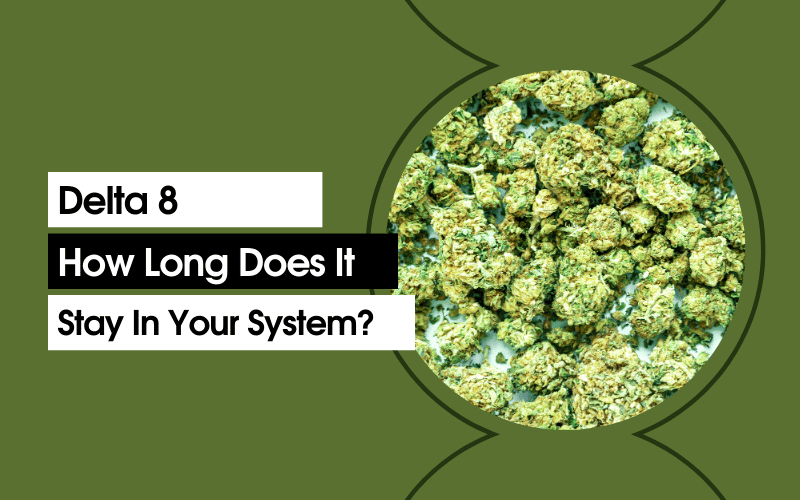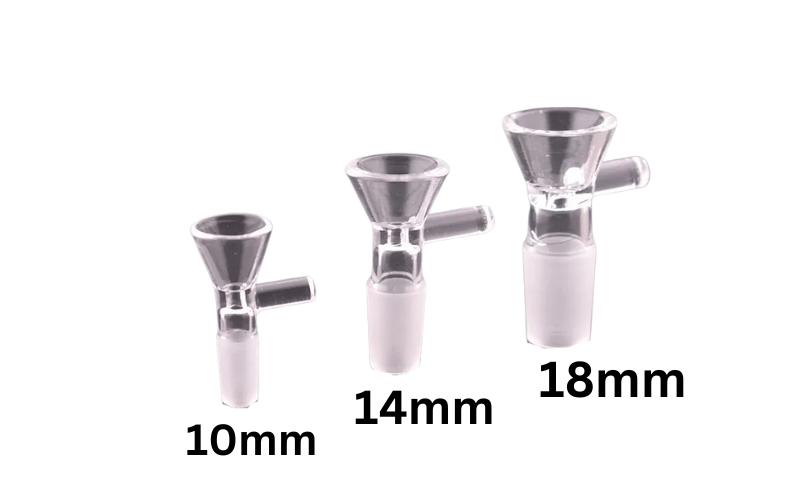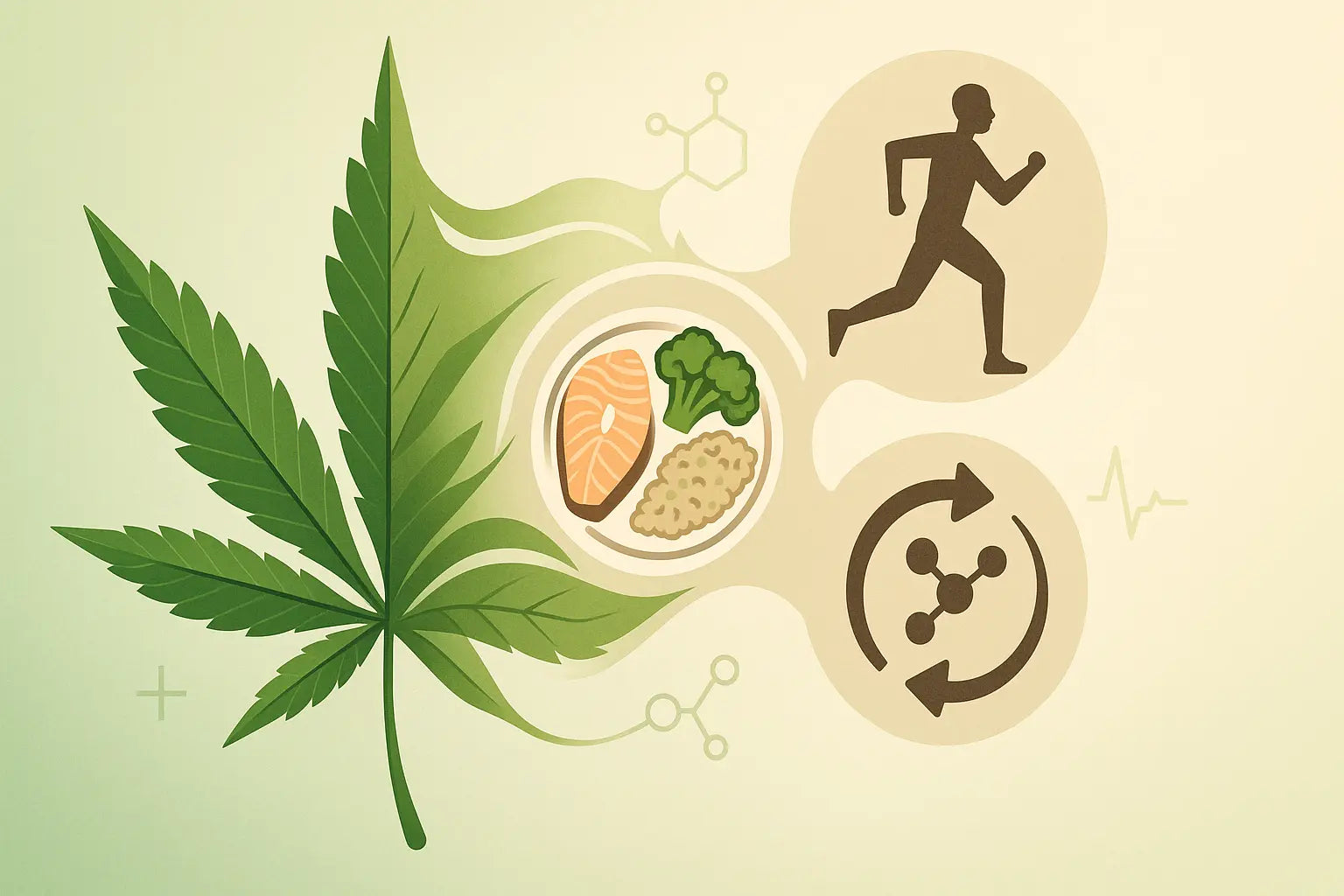
Does Smoking Cannabis Make You Lose Weight? The Truth Revealed
Posted by Tom Wittneben on
Does smoking cannabis help you shed pounds? It’s not a simple yes or no. Curiously, cannabis users often maintain lower body weight even though they may consume more calories. After using marijuana, appetite typically increases, a phenomenon known as the 'munchies', as THC impacts hunger hormones, taste, and smell.
Among young adults, this could be partly due to drinking less alcohol, which tends to keep their body mass index (BMI) down. There’s also evidence that cannabis may affect weight in ways we still don’t completely understand.
That’s why this article unpacks how cannabis influences appetite, metabolism, and body weight, breaking down the science behind these surprising findings.
Key Takeaways
-
Current research indicates no strong evidence that cannabis directly causes weight loss, with some studies suggesting it may stimulate appetite instead.
-
Cannabinoids, particularly THC and CBD, have complex effects on appetite and metabolism, with the psychoactive effects of THC influencing CB1 receptors that play a role in appetite and metabolic processes, potentially affecting weight management.
-
Regular cannabis use is associated with lower BMI, as supported by laboratory studies, but increased caloric intake may not lead to weight gain, highlighting a need for further research into the relationship between cannabis and body weight.
Can Smoking Cannabis Lead to Weight Loss?
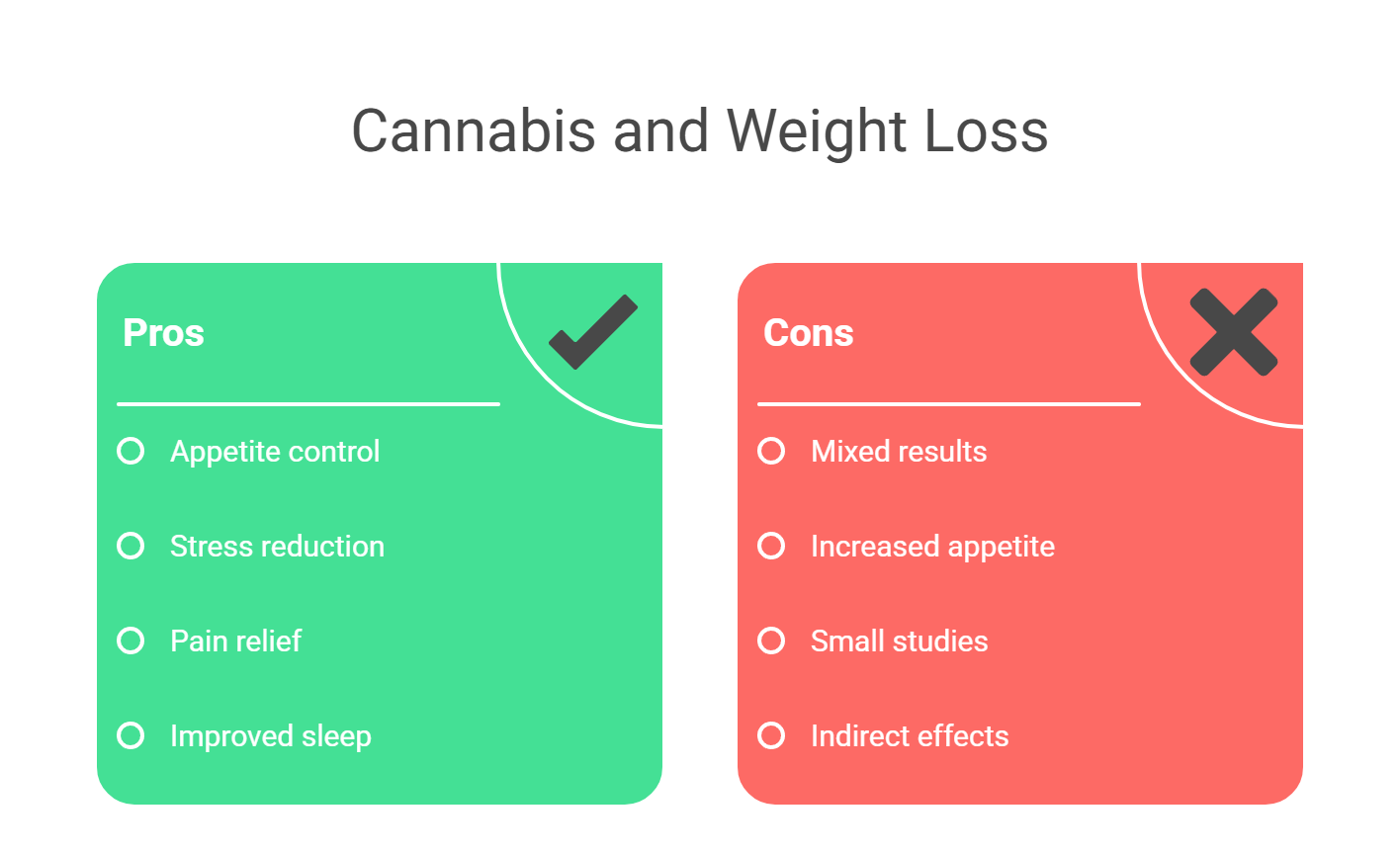
To answer straightforwardly, the link between cannabis and weight loss isn’t clear. No solid evidence proves marijuana directly cuts body weight, leaving its effects murky. Smoking marijuana may not be the weight loss trick some hope for. However, some experts say cannabis boosts hunger rather than trims pounds.
So, counting on cannabis as a weight-loss tool lacks strong backing.
That said, studies show mixed results, making it hard to pin down how marijuana affects weight. Some find that cannabis users eat more calories but still have a lower BMI, hinting at a paradox between hunger and energy use. Although, this increased appetite from marijuana use doesn’t always lead to people gaining weight; in fact, some individuals may even be losing weight despite increased caloric intake.
This suggests cannabis might ramp up calorie intake while easing stress-related overeating, which can help with weight control. Some people use cannabis to manage stress and appetite. The munchies are real, but they don’t always pack on pounds.
Nevertheless, more research is needed to sort this out, as many studies use small groups, limiting their reliability.
Using marijuana might affect body weight indirectly through lifestyle changes. For instance, cannabis may also ease chronic pain or improve sleep, which can support healthier habits.
The endocannabinoid system, which regulates a range of bodily functions, appears to play a role in how cannabis users manage weight. Notwithstanding, the issue is layered, and we need longer, larger studies to draw firm conclusions about cannabis and weight management.
How Cannabinoids Influence Appetite and Metabolism
Cannabis contains cannabinoids that play a big role in appetite and metabolism. This endocannabinoid system, a network in your body, helps balance energy and metabolism, driving how cannabis use affects weight management.
Not just that, it interacts with cannabis to tweak how your body stores and burns energy via cannabinoid receptors. In particular, cannabinoid receptor 1 shapes metabolism, food intake, and weight.
On the flip side, THC, the psychoactive compound in cannabis, boosts hunger by raising ghrelin, a hormone that makes you hungry, and lowering leptin, which signals fullness. After you have consumed cannabis, appetite typically increases due to elevated levels of hunger hormones. This increased appetite from smoking weed can lead to more food intake.
People who have consumed cannabis often report eating more due to these hormonal changes, a phenomenon we have previously identified as the munchies.
On the contrary, some people believe that THC might temporarily boost the body’s metabolic rate, possibly helping to burn off some of the extra calories consumed during bouts of the “munchies.”
CBD, another cannabis compound, also sparks appetite but may speed up metabolism and cut food intake, which could aid weight loss. Studies suggest CBD turns white fat cells into brown fat, which burns energy faster, supporting weight loss efforts.
What’s more, despite users reporting higher calorie intake, cannabis users often have a lower BMI. Over time, marijuana users might see a reduced body mass index. While low doses of cannabis appear to have little impact on weight, higher doses can significantly ramp up calorie consumption.
This pattern suggests that cannabis might boost metabolism enough to offset extra eating, at least, to some degree. It is possible that smoking weed could tweak energy storage in ways that prevent weight gain. Still, more studies are needed to clarify how these mechanisms work and what they mean for weight management.
The Role of THC in Weight Management
THC, the main psychoactive compound in cannabis, affects weight through its psychoactive effects. These psychoactive effects are responsible for its impact on hunger hormones, spiking ghrelin to trigger cravings and dropping leptin to keep you hungry. This appetite stimulant effect makes THC tricky for weight management. Plus, THC is used to boost appetite in patients suffering from cancer or HIV/AIDS.
Meanwhile, THC can briefly speed up metabolism, which might help with weight control as marijuana use might burn calories faster than expected. This boost in energy use could balance out the extra snacking THC encourages.
However, THC also lights up brain reward centers, pushing users toward calorie-rich foods. These mixed effects make THC a tricky player in weight management, with both pros and cons.
CBD’s Potential Impact on Weight Loss
CBD or Cannabidiol offers a different path for weight management compared to THC. As we have seen already, CBD may convert white fat into brown fat, which burns more energy, helping cannabis users avoid increasing weight. Such an effect could raise your metabolic rate and support weight loss. CBD also improves insulin function, helping regulate blood sugar and possibly reducing fat buildup. Improved insulin function may help reduce insulin resistance, a key factor linked to weight gain and metabolic issues.
Still, these effects sound promising, but more research is needed to confirm CBD’s role in weight loss. Its long-term impact on health and weight management remains unclear, so it’s not a magic fix yet.
Cannabis Use and Body Mass Index (BMI)
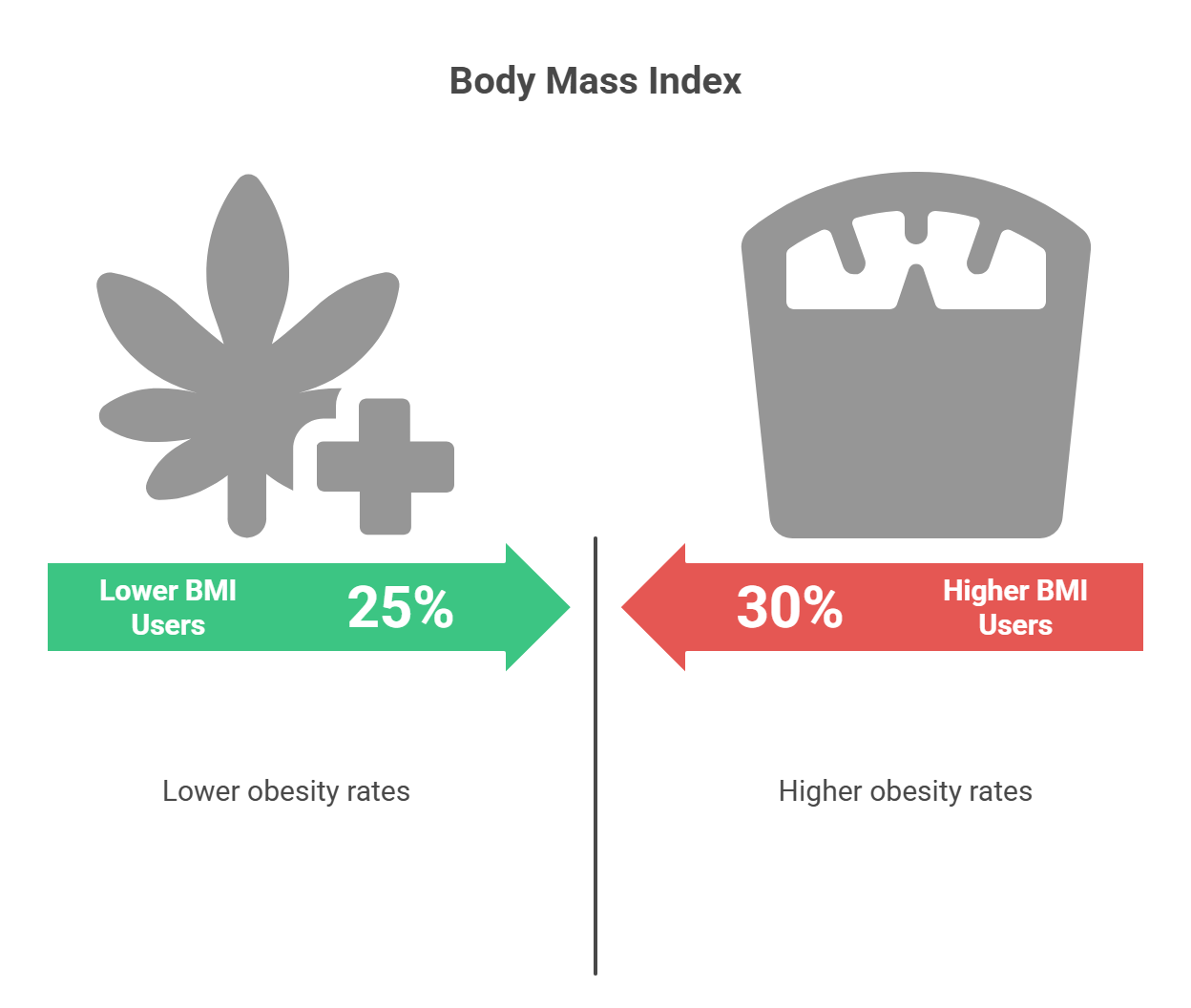
Regular cannabis use often ties to a lower BMI and less obesity. Epidemiological data back this up, noting lower obesity rates among users. Research consistently finds a lower body mass index among regular cannabis users compared to those with a higher body mass index. Users also tend to have smaller waist sizes, suggesting cannabis might help keep weight in check.
This odd pattern suggests cannabis may tweak metabolism to prevent weight gain, as findings of reduced BMI are supported by similar conclusions across multiple studies, but the exact how and why are still fuzzy.
Marijuana Use and Obesity Rates
Marijuana users tend to have lower obesity rates than non-users. A 2011 review of two surveys showed obesity was more common among non-users than those using cannabis at least three days a week. So, authors concluded cannabis use might lower obesity rates.
These findings hint at a weight management benefit, but more research is needed to understand why. Cannabis, like other drugs that influence appetite and metabolism, may play a role in affecting body weight and metabolic processes.
Marijuana Strains and Their Effects on Weight
Different marijuana strains can affect weight through their impact on activity. Some people who smoke weed may experience different effects on weight depending on the strain they use. Some strains make consuming marijuana more active, supporting weight loss. Some, when used before exercise, sharpen focus, ease pain, or make workouts more fun, supporting weight management. Others might sap motivation or mess with coordination, making exercise tougher and possibly leading to weight gain. The effect depends on the strain and your body’s response.
Cannabis and Exercise
Cannabis can influence exercise, a key part of weight management. Using marijuana before workouts might enhance physical activity. It might boost focus, cut anxiety, or make moving feel better. Cannabis can also reduce stress, which may indirectly support weight management.
But THC can slow heart function, which may hinder intense exercise. Plus, munchies can lead to extra calories, undoing workout gains.
On the other hand, a healthy diet often helps cannabis users avoid weight gain. So, to lose weight, pair cannabis with a healthy diet and regular exercise.
Risks and Considerations of Using Cannabis for Weight Loss
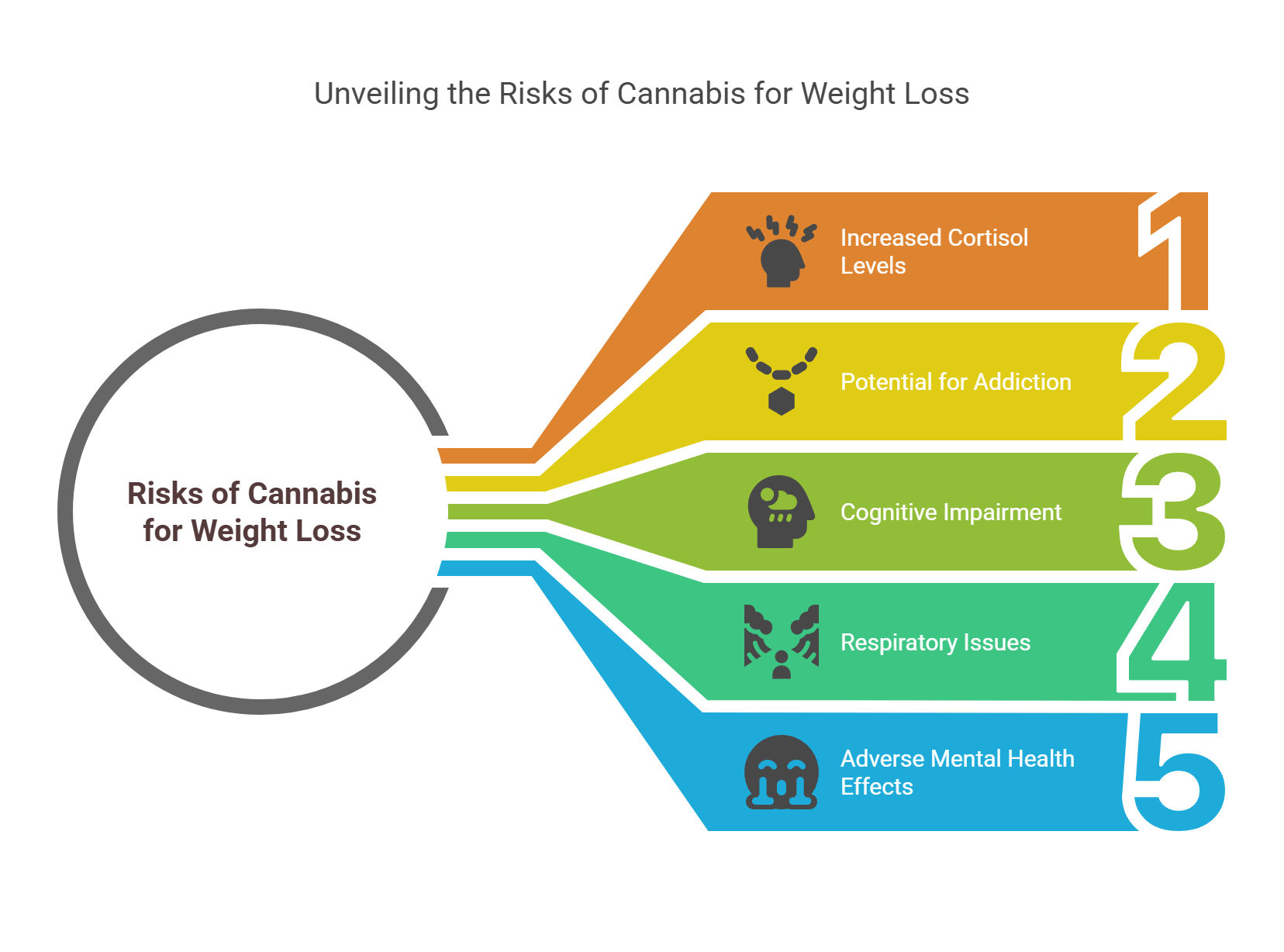
Using cannabis to lose weight comes with risks. First, chronic stress can raise cortisol, increasing emotional eating and stalling weight loss, making marijuana use less effective for weight loss. It is important to recognize that cannabis is a psychoactive drug and should be approached with caution due to its potential for dependence and other health risks.
Other concerns include:
-
It can lead to both psychological and physical addiction, rendering it a poor choice for managing one’s weight.
-
Dependence could become an issue with prolonged usage.
-
Users might experience diminished cognitive function.
-
Issues related to respiratory health may arise.
-
Mental health could be adversely affected.
All things considered, these risks can have the opposite effect, harming mental health and weight goals. These make cannabis a shaky choice for weight loss. Safer, long-term strategies are worth exploring instead.
Weight Loss Strategies for Cannabis Users
Cannabis users aiming to lose weight can adopt smart habits. A healthy diet is key for marijuana users chasing weight loss. Eat whole foods like fruits, veggies, and lean proteins, and skip processed foods or comfort foods.
Also, regular exercise, like jogging or lifting weights, burns calories and builds muscle. You can also cut caloric intake to help balance the munchies. Start with smaller meals to curb overeating. Add good sleep and stress management to that, and find yourself keeping your appetite in check.
By contrast, you don’t need cannabis to lose weight. Avoiding processed foods cuts calories for weight loss. To supplement that, load up on fruits, veggies, and whole grains. If you're not tracking what you eat, you're leaving your weight management to chance. Lastly, you can glean support from friends or groups to build motivation for lasting results.
Additional Resources and Next Steps
If you're interested in learning more, The National Institutes of Health offers studies on cannabis and appetite. Clinical trials, for example, are exploring how cannabis affects body weight and metabolism.
For practical insights and shared experiences, online forums and support groups offer valuable tips for cannabis users managing their weight.
To receive advice that is tailored to your specific needs and health goals, consider talking to a doctor or a healthcare provider.
These resources help you make smart choices for your health, whether you’re aiming to lose weight or stay fit.
The Bottom Line on Cannabis and Weight Loss
The link between cannabis and weight loss is tricky. Marijuana use can spark increased calorie intake but not always weight gain.
THC drives hunger, while CBD might curb it, leading to mixed results. The general population might not see the same BMI benefits as cannabis users. Lifestyle factors, like diet and exercise, likely play a bigger role in weight than cannabis alone.
Moving forward, more studies suggest cannabis use needs deeper research for weight effects. Long-term studies are needed to unravel how cannabis affects your body and health. If you’re thinking about using it, talk to a doctor who knows your health needs to weigh the pros and cons, especially for medical conditions.
Summary
Cannabis and weight loss don’t have a clear connection. Some studies show benefits, like lower BMI or less stress eating, but risks and mixed findings complicate the picture. Using marijuana for weight loss remains unproven, with complex effects on the body.
Cannabinoids, appetite, metabolism, and user habits all create a tangled web in weight management. Therefore, using cannabis for weight loss needs caution and ideally a doctor’s guidance.
For reliable gear to enhance your cannabis experience, Mary Go Round has you covered. As research continues, we’ll learn more about cannabis and weight, helping you make informed health choices.
Want to be a part of the cannabis move?
Frequently Asked Questions
Can smoking cannabis help me lose weight?
While some studies indicate that regular cannabis users may have a lower BMI, there is no clear evidence that cannabis directly causes weight loss. Therefore, relying on cannabis for weight management is not advisable.
How does THC in cannabis affect appetite?
Cannabis contains THC, which triggers hunger by elevating ghrelin and reducing leptin levels, resulting in an increased desire to eat – a phenomenon commonly known as “the munchies.” Such an effect can be problematic for individuals who are striving to control their weight.
What is the role of CBD in weight loss?
CBD may assist with weight loss by encouraging the conversion of white adipose tissue to a state that expends more energy, and it can also improve insulin sensitivity, which helps in preventing the buildup of fat. Adding CBD into your routine could be beneficial for your weight loss endeavors.
Are there any risks associated with using cannabis for weight loss?
Using cannabis for weight loss carries significant risks, including psychological and physical dependence and adverse effects on mental health, rendering it an unsuitable method for weight management.
What are some alternative strategies for weight loss?
Incorporating a nutritious diet that includes an abundance of fruits, vegetables, and whole grains, coupled with consistent physical activity and the practice of eating attentively, are successful methods for achieving lasting weight reduction. Effectively handling stress levels and cultivating a network of support can also boost your weight loss endeavors.


